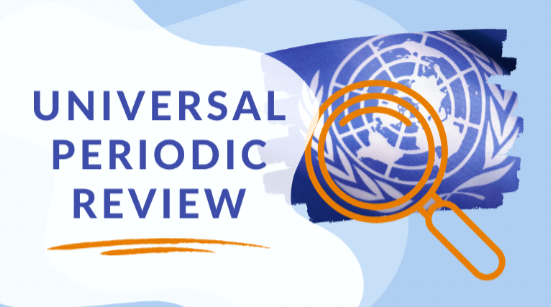The Universal Periodic Review (UPR) is a process of periodic review of the human rights records of the 193 member states of the UN, established by the Human Rights Council in 2006. The UPR provides an opportunity for all countries to assess the steps they have taken to improve their human rights situation and to address challenges.
Reviews are based on reports submitted by states, reports by independent human rights experts and information provided by civil society organisations. The results of the review are summarised in a report and assessed by the Council. Countries are responsible for implementing the recommendations contained in this report and progress is monitored.
The Universal Periodic Review (UPR) cycle lasts four and a half years (HRC resolution 16/21).During one cycle, it is expected that the human rights records of all UN member states will be reviewed. Reviews are carried out at the following pace during the three annual sessions of the UPR Working Group:
14 countries are reviewed per session;
42 countries are reviewed per year;
By the end of a UPR cycle, all 193 UN member states will have been reviewed. Through the Universal Periodic Review (UPR), the Human Rights Council will periodically review the implementation of human rights obligations and commitments of the 193 United Nations Member States.
Review Process: A State’s review is based on the following documents;
National report: Report prepared by the reviewed State.
United Nations Information: Compilation on the State prepared by the Office of the United Nations High Commissioner for Human Rights (OHCHR).
Information from other stakeholders: Summary report prepared by the OHCHR includes information submitted by other stakeholders, such as civil society actors, national human rights institutions and regional organizations.
The review takes place in Geneva at the sessions of the UPR Working Group. This group consists of the 47 member States of the Human Rights Council. The review takes place in the form of an interactive dialogue between the reviewed State and the member and observer States of the Council. At the end of each review, the Working Group adopts a conclusion document, which is then considered by the Human Rights Council at another session.
Contributions of “Other Stakeholders” to UPR Documents: The UPR process ensures the participation of all relevant stakeholders, such as civil society organizations (CSOs), national human rights institutions (NHRIs) and regional mechanisms. Submission of Written Information: Civil society actors, NHRIs and regional mechanisms can submit written reports containing information that will be taken into account during the review.
Participation in Sessions: Accredited stakeholders can observe UPR Working Group sessions and make oral statements at regular sessions of the Human Rights Council. The 49th UPR Working Group Session, where Turkey will be assessed, will be held between 28 April 2025 and 9 May 2025. In this session, the human rights situations of the countries determined within the scope of the Universal Periodic Review (UPR) process will be reviewed. In this context, the report “The Systematic Failure of Turkey to Implement the ECHR Decisions” prepared by our foundation was submitted to the UPR.





